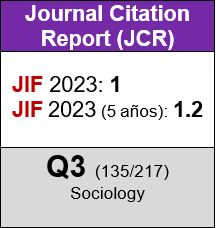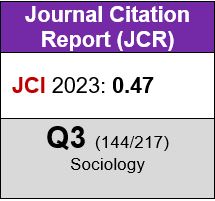Desigualdad económica y confianza social: evidencia de los cambios observados en 19 países entre 1990 y 2020
DOI:
https://doi.org/10.5477/cis/reis.185.119-144Palabras clave:
Componentes longitudinales, Componentes transversales, Confianza social, Desigualdad económica, REWBResumen
Análisis agregados o con datos individuales de sección cruzada indican que la desigualdad económica erosiona la confianza
social. Este trabajo reevalúa esta asociación distinguiendo entre
los componentes transversales y longitudinales de la desigualdad, usando para ello una muestra de casi 140 000 individuos de 19 países, a lo largo de treinta años (1990-2020). Los resultados sugieren que hay una relación negativa y robusta entre desigualdad y confianza entre países controlando por variables sociodemográficas y actitudinales, y por el efecto directo y condicional del ingreso.
Los individuos en países con mayor desigualdad reportan sistemáticamente menor confianza social, pero la evidencia es menos consistente con que la confianza varíe con la desigualdad. En la segunda parte del trabajo se reafirman estos hallazgos utilizando datos a nivel subnacional de España entre 2008 y 2022.
Descargas
Citas
Alesina, Alberto y La Ferrara, Eliana (2002). «Who Trusts Others?». Journal of Public Economics, 85(2): 207-234. DOI: https://doi.org/10.1016/S0047-2727(01)00084-6
Beck, Nathaniel (2001). «Time-series-cross-section Data: What Have We Learned in the Past Few Years?». Annual Review of Political Science, 4: 271-293. DOI: https://doi.org/10.1146/annurev.polisci.4.1.271
Berning, Carl y Ziller, Conrad (2017). «Social Trust and Radical Right-wing Populist Party Preferences». Acta Politica, 52: 198-217. DOI: https://doi.org/10.1057/ap.2015.28
Bjørnskov, Christian (2007). «Determinants of Generalized Trust: A Cross-country Comparison». Public Choice, 130: 1-21. DOI: https://doi.org/10.1007/s11127-006-9069-1
Bjørnskov, Christian (2008). «Social Trust and Fractionalization: A Possible Reinterpretation». European Sociological Review, 24(3): 271-283. DOI: https://doi.org/10.1093/esr/jcn004
Coffé, Hilde y Geys, Benny (2006). «Community Heterogeneity: A Burden for the Creation of Social Capital?». Social Science Quarterly, 87(5): 1053-1072. DOI: https://doi.org/10.1111/j.1540-6237.2006.00415.x
Coleman, James (1990). Foundations of Social Theory. Cambridge: Harvard University Press.
Converse, Nathan y Kapstein, Ethan B. (2008). «Poverty, Inequality, and Democracy: Why Democracies Fail». Journal of Democracy, 19(4): 57-68. Disponible en: https://www.journalofdemocracy.org/articles/poverty-inequality-and-democracy-why-democracies-fail/, acceso 6 de febrero de 2023. DOI: https://doi.org/10.1353/jod.0.0031
Cook, Karen S. (2005). «Networks, Norms, and Trust: The Social Psychology of Social Capital». Social Psychology Quarterly, 68(1): 4-14. DOI: https://doi.org/10.1177/019027250506800102
Cozzolino, Philip J. (2011). «Trust, Cooperation, and Equality: A Psychological Analysis of the Formation of Social Capital». British Journal of Social Psychology, 50: 302-320. DOI: https://doi.org/10.1348/014466610X519610
Daniels, Joseph P. y Ruhr, Marc von der (2010). «Trust in Others: Does Religion Matter?». Review of Social Economy, 68(2): 163-186. DOI: https://doi.org/10.1080/00346760902968447
Delhey, Jan y Newton, Kenneth (2003). «Who Trusts? The Origins of Social Trust in Seven Societies». European Societies, 5(2): 93-137. DOI: https://doi.org/10.1080/1461669032000072256
Diez Roux, Ana V. (2003). «Potentialities and Limitations of Multilevel Analysis in Public Health and Epidemiology». En: D. Courgeau (ed.). Methodology and Epistemology of Multilevel Analysis, (pp. 93-119). Dordrecht: Kluwer Academic Publishers. DOI: https://doi.org/10.1007/978-1-4020-4675-9_4
Dingemans, Ellen y Ingen, Erik van (2015). «Does Religion Breed Trust? A Cross-national Study of the Effects of Religious Involvement, Religious Faith and Religious Context on Social Trust». Journal for the Scientific Study of Religion, 54(4): 739-755. DOI: https://doi.org/10.1111/jssr.12217
Duijndam, Sem y Beukering, Pieter van (2021). «Understanding Public Concern about Climate Change in Europe, 2008–2017: The Influence of Economic Factors and Right-wing Populism». Climate Policy, 21(3): 353-367. DOI: https://doi.org/10.1080/14693062.2020.1831431
Durkheim, Emilie (1984) [1893]. The Division of Labor in Society. New York: The Free Press. DOI: https://doi.org/10.1007/978-1-349-17729-5
Easterly, William (2007). «Inequality Does Cause Underdevelopment: Insights from a New Instrument». Journal of Development Economics, 84: 755-776. DOI: https://doi.org/10.1016/j.jdeveco.2006.11.002
Fairbrother, Malcolm (2014). «Two Multilevel Modeling Techniques for Analyzing Comparative Longitudinal Survey Datasets». Political Science Research and Methods, 2: 119-140. DOI: https://doi.org/10.1017/psrm.2013.24
Fairbrother, Malcolm y Martin, Isaac W. (2013). «Does Inequality Erode Social Trust? Results from Multilevel Models of US States and Counties». Social Science Research, 42(2): 347-60. DOI: https://doi.org/10.1016/j.ssresearch.2012.09.008
Feenstra, Robert C.; Inklaar, Robert y Timmer, Marcel P. (2015). «The Next Generation of the Penn World Table». American Economic Review, 105(10): 3150-3182. DOI: https://doi.org/10.1257/aer.20130954
Freitag, Markus y Bühlmann, Marc (2009). «Crafting Trust. The Role of Political Institutions in a Comparative Perspective». Comparative Political Studies, 42(12): 1537-1566. DOI: https://doi.org/10.1177/0010414009332151
Freitag, Markus y Traunmüller, Richard (2009). «Spheres of Trust: An Empirical Analysis of the Foundations of Particularised and Generalised Trust». European Journal of Political Research, 48(6): 782-803. DOI: https://doi.org/10.1111/j.1475-6765.2009.00849.x
Fukuyama, Francis (1995). Trust: The Social Virtues and the Creation of Prosperity. New York: Free Press.
Gallego, Aina (2016). «Inequality and the Erosion of Trust among the Poor: Experimental Evidence». Socio-Economic Review, 14(3): 443-460. DOI: https://doi.org/10.1093/ser/mww010
Graafland, Johan y Lous, Bjorn (2019). «Income Inequality, Life Satisfaction Inequality and Trust: A Cross Country Panel Analysis». Journal of Happiness Studies, 20: 1717-1737. DOI: https://doi.org/10.1007/s10902-018-0021-0
Hardin, Russell (2006). Trust. Cambridge: Polity Press.
Hastings, Orestes P. (2018). «Less Equal, Less Trusting? Longitudinal and Cross-sectional Effects of Income Inequality on Trust in U.S. States, 1973-2012». Social Science Research, 74: 77-95. DOI: https://doi.org/10.1016/j.ssresearch.2018.04.005
Heisig, Jan P. y Schaeffer, Merlin (2019). «Why You Should Always Include a Random Slope for the Lower-Level Variable Involved in a Cross-Level Interaction». European Sociological Review, 35(2): 258-279. DOI: https://doi.org/10.1093/esr/jcy053
INE. Instituto Nacional de Estadística y Geografía (2021). Indicadores de Calidad de Vida. Desigualdad S80/S20. Disponible en: https://www.ine.es/ss/Satellite?L=es_ES&c=INESeccion_C&cid=1259944509412&p=1254735110672&pagename=ProductosYServicios%2FPYSLayout¶m1=PYSDetalleFichaIndicador¶m3=1259937499084, acceso 22 de febrero de 2023.
Inglehart, Ronald y Flanagan, Scott (1987). «Value Change in Industrial Societies». American Political Science Review, 81(4): 1289-1319. DOI: https://doi.org/10.2307/1962590
Johnson, Noel D. y Mislin, Alexandra (2012). «How much Should We Trust the World Values Survey Trust Question?». Economics Letters, 116(2): 210-212. DOI: https://doi.org/10.1016/j.econlet.2012.02.010
Jordahl, Henrik (2007). «Inequality and Trust». IFN Working Paper No. 715. Disponible en: https://www.ifn.se/Wfiles/wp/wp715.pdf, acceso 25 de noviembre de 2022.
Kanitsar, Georg (2022). «The Inequality-Trust Nexus Revisited: At What Level of Aggregation Does Income Inequality Matter for Social Trust?». Social Indicators Research, 163: 171-195. DOI: https://doi.org/10.1007/s11205-022-02894-w
Kawachi, Ichiro; Kennedy, B. P.; Lochner, K. y Prothrow-Stith, D. (1997). «Social Capital, Income Inequality, and Mortality». American Journal of Public Health, 87: 1491-1498. DOI: https://doi.org/10.2105/AJPH.87.9.1491
Kennedy, B. P.; Kawachi, I.; Prothrow-Stith, D.; Lochner, K. y Gupta, V. (1998). «Social Capital, Income Inequality, and Firearm Violent Crime». Social Science & Medicine, 47(1): 7-17. DOI: https://doi.org/10.1016/S0277-9536(98)00097-5
Knack, Stephen y Keefer, Philip (1997). «Does Social Capital Have an Economic Payoff? A Cross-Country Investigation». Quarterly Journal of Economics, 112: 1251-1288. DOI: https://doi.org/10.1162/003355300555475
La Porta, Rafael; Lopez-de-Silanes, Florencio; Shleifer, Andrei y Vishny, Robert W. (1997). «Trust in Large Organizations». American Economic Review, 87: 333-338. DOI: https://doi.org/10.3386/w5864
Morris, Stephen D. y Klesner, Joseph L. (2010). «Corruption and Trust: Theoretical Considerations and Evidence From Mexico». Comparative Political Studies, 43(10): 1258-1285. DOI: https://doi.org/10.1177/0010414010369072
Piketty, Thomas y Saez, Emmanuel (2014). «Inequality in the Long Run». Science, 344(6186): 838-843. DOI: https://doi.org/10.1126/science.1251936
Ridgeway, Cecilia (2014). «Why Status Matters for Inequality». American Sociological Review, 79: 1-16. DOI: https://doi.org/10.1177/0003122413515997
Rothstein, Bo y Uslaner, Eric M. (2005). «All for All: Equality, Corruption, and Social Trust». World Politics, 58(1): 41-72. DOI: https://doi.org/10.1353/wp.2006.0022
Sampson, Robert J.; Morenoff, Jeffrey D. y Gannon-Rowley, Thomas (2002). «Assessing “Neighborhood Effects”: Social Processes and New Directions in Research». Annual Review of Sociology, 28(1): 443-478. DOI: https://doi.org/10.1146/annurev.soc.28.110601.141114
Sánchez-Ancochea, Diego (2020). The Costs of Inequality in Latin America: Lessons and Warnings for the Rest of the World. London: I. B. Tauris. DOI: https://doi.org/10.5040/9781838606275
Schmidt-Catran, Alexander W. (2016). «Economic Inequality and Public Demand for Redistribution: Combining Cross-sectional and Longitudinal Evidence». Socio-Economic Review, 14(1): 119-140. DOI: https://doi.org/10.1093/ser/mwu030
Schmidt-Catran, Alexander W. y Fairbrother, Malcolm (2015). «The Random Effects in Multilevel Models: Getting Them Wrong and Getting Them Right». European Sociological Review, 32(1): 23-38. DOI: https://doi.org/10.1093/esr/jcv090
Schmidt-Catran, Alexander W.; Fairbrother, Malcolm y Andreß, Hans-Jürgen (2019). «Multilevel Models for the Analysis of Comparative Survey Data: Common Problems and Some Solutions». Köln Z Soziol, 71(1): 99-128. DOI: https://doi.org/10.1007/s11577-019-00607-9
Scruggs, Lyle y Benegal, Salil (2012). «Declining Public Concern about Climate Change: Can We Blame the Great Recession?» Global Environmental Change, 22(2): 505-515. DOI: https://doi.org/10.1016/j.gloenvcha.2012.01.002
Seawright, Jason y Gerring, John (2008). «Case Selection Techniques in Case Study Research: A Menu of Qualitative and Quantitative Options». Political Research Quarterly, 61(2): 294-308. DOI: https://doi.org/10.1177/1065912907313077
Solt, Frederick (2020). «Measuring Income Inequality Across Countries and Over Time: The Standardized World Income Inequality Database». Social Science Quarterly, 101(3): 1183-1199. SWIID Version 9.4, Noviembre 2022. DOI: https://doi.org/10.1111/ssqu.12795
Subramanian, S. V. y Kawachi, Ichiro (2004). «Income Inequality and Health: What Have We Learned So Far?». Epidemiologic Reviews, 26: 78-91. DOI: https://doi.org/10.1093/epirev/mxh003
Subramanian, S. V.; Jones, Kelvyn; Kaddour, Afamia y Krieger, Nancy (2009). «Revisiting Robinson: The Perils of Individualistic and Ecologic Fallacy». International Journal of Epidemiology, 38: 342-60. DOI: https://doi.org/10.1093/ije/dyn359
Suryahadi, Asep; Al Izzati, Ridho; Suryadarma, Daniel y Dartanto, Teguh (2023). «How Inequality Affects Trust in Institutions: Evidence from Indonesia». Asian Economic Policy Review, 18: 73-91. DOI: https://doi.org/10.1111/aepr.12401
Svendsen, Gert T. y Svendsen, Lind H. (2008). Handbook of Social Capital. Cheltenham: Edward Elgar. DOI: https://doi.org/10.4337/9781848447486
Uslaner, Eric M. (2002). The Moral Foundations of Trust. New York: Cambridge University Press. DOI: https://doi.org/10.2139/ssrn.824504
Uslaner, Eric M. (2008). «The Foundations of Trust: Macro and Micro». Cambridge Journal of Economics, 32(2): 289-294. DOI: https://doi.org/10.1093/cje/bem039
Uslaner, Eric M. y Brown, Mitchell (2005). «Inequality, Trust, and Civic Engagement». American Politics Research, 33(6): 868-894. DOI: https://doi.org/10.1177/1532673X04271903
Welch, Michael R.; Sikkink, David y Loveland, Matthew T. (2007). «The Radius of Trust: Religion, Social Embeddedness and Trust in Strangers». Social Forces, 86(1): 23-46. DOI: https://doi.org/10.1353/sof.2007.0116
Wilkinson, Richard G. y Pickett, Kate E. (2009). «Income Inequality and Social Dysfunction». Annual Review of Sociology, 35: 493-511. DOI: https://doi.org/10.1146/annurev-soc-070308-115926
Wilkinson, Richard G. y Pickett, Kate E. (2017). «The Enemy between Us: The Psychological and Social Costs of Inequality». European Journal of Social Psychology, 47: 11-24. DOI: https://doi.org/10.1002/ejsp.2275
You, Jong-Sung y Khagram, Sanjeev (2005). «A Comparative Study of Inequality and Corruption». American Sociological Review, 70(1): 136-157. doi: 10.1177/000312240507000107 DOI: https://doi.org/10.1177/000312240507000107
Zucman, Gabriel (2019). «Global Wealth Inequality». Annual Review of Economics, 11(1): 109-138. DOI: https://doi.org/10.1146/annurev-economics-080218-025852
Descargas
Publicado
Cómo citar
Número
Sección
Licencia
Derechos de autor 2023 Revista Española de Investigaciones Sociológicas

Esta obra está bajo una licencia internacional Creative Commons Atribución-CompartirIgual 4.0.
Permite Compartir — copiar y redistribuir el material en cualquier medio o formato, Adaptar — remezclar, transformar y construir a partir del material para cualquier propósito, incluso comercialmente.








